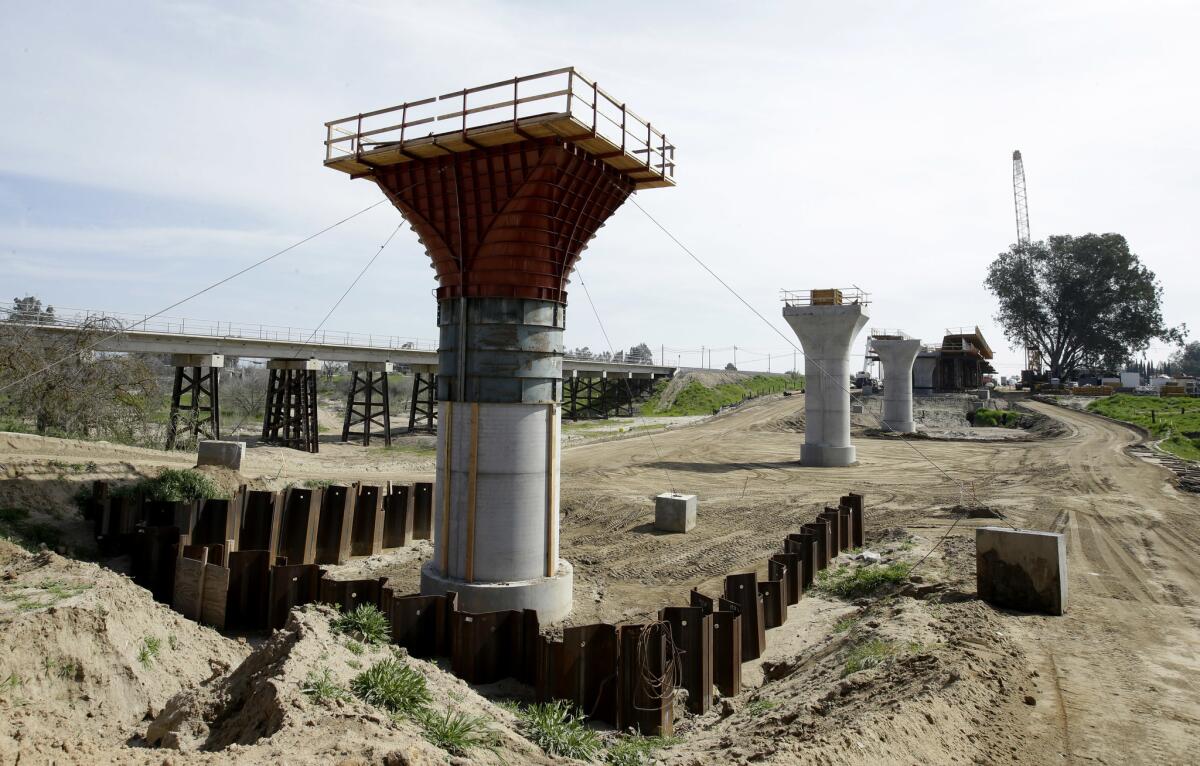Ballot measure that could have derailed the bullet train project is put on hold

The supports for a 1,600-foot-viaduct to carry high-speed rail trains across the Fresno River are seen under construction near Madera, Calif.
California’s bullet train dodged a major threat Friday as critics delayed a proposed ballot measure that would have taken $8 billion in high-speed rail bonds and reallocated them for water projects.
Backers announced they were likely to postpone the effort for two years, citing the cost of gathering enough signatures to qualify a proposition for the November ballot.
Had voters approved the plan, it would have delivered a virtual death blow to the $64-billion bullet train project by taking away the biggest source of its funding.
The California High-Speed Rail Authority warned that the ballot measure effort, if successful, could leave billions of dollars of infrastructure stranded in the Central Valley, an argument that it was too late to stop the bullet train.
California Water Alliance, a group that includes Central Valley farmers, called for the rail bond money to be used instead to build new dams and enlarge existing ones in light of the state’s severe four-year drought.
The suspension of the campaign clears the rail project for the time being from a threat that voters could gut it. But it continues to face legal, technical and political challenges. An oversight hearing in the Assembly scheduled for Monday will examine the project’s plan to build an initial segment from San Jose to the Central Valley. The water alliance says it gathered about 300,000 signatures over the last month, about a third of the support needed to qualify the proposal for the November ballot. But it said that the cost of the campaign was growing more expensive than it had planned, as contractors began doubling the price for each signature to more than $5 each.
The alliance’s proposition included a constitutional amendment that would have made residential and agricultural uses of water the state’s two top priorities, lowering the importance of environmental claims on river flows. In addition, it would have tapped $2.7 billion in funds for water projects that were previously approved by voters in 2014’s Proposition 1. Opponents said it was overreaching with all of the elements it wanted voters to approve.
About $400,000 for the campaign was raised from Central Valley agricultural interests, which desperately need more water amid the ongoing drought and represent the stiffest opposition to the rail project because of impacts on farms and processing plants. Farmers, dug deep to make contributions of as much as $25,000 each to get the measure on the ballot.
But the fundraising stopped well short of what was needed. Aubrey Bettencourt, executive director of the alliance, said in February that she had commitments for a $2-million petition campaign, enough to pay for about $2.60 per signature. But competition with other political propositions drove up the costs of getting those names to the point that it became uneconomical to continue, said Hector Barajas, a spokesman for the alliance.
The effort was suspended Thursday on the advice of the campaign’s political consultant, Michael Arno, but Barajas said the petition campaign would resume next month with the aim of getting the proposal on the 2018 ballot.
“We are not shutting it down,” he said.
The delay could damage, if not destroy, the effort, because both the state’s water situation and the status of the bullet train project could dramatically change in the next two years.
The proposal had tapped two politically powerful sentiments: public concern about the state’s grim water outlook and widespread opposition to the high-speed rail project. In two years, the water situation could get better or worse, an uncertain dynamic that also affects the bullet train.
By 2018, a significant amount of work on 118 miles of rail line in the Central Valley will have been completed. If it is done within budget, the public might be enthused by the potential of a 220-mph transportation system, or cost overruns and delays could further sour popular opinion. The chief supporter of the project, Gov. Jerry Brown, will be on his way out of office by then as well.
On Friday, rail chief Dan Richard said, “Californians deserve both quality water and transportation programs, and have voted for both. We are committed to delivering a high-speed rail program that will transform California and modernize our passenger rail systems.”
The decision to delay the campaign left supporters disappointed.
“I was quite upset about it,” said Karen Musson, owner of Gar Tootelian Farms, in the Sierra foothills of Fresno County. “The longer the supporters can wait and the more they can delay, the more successful they will be.”
Musson, who grows mandarin oranges on about 100 acres, said the drought has dramatically increased her costs, requiring her to pump and treat groundwater for her orchards. Musson wrote a $25,000 check for the campaign, as did some other growers.
When the proposal first surfaced, it seemed likely that the biggest opposition would come from organized labor and the construction industry, both longtime supporters of the high-speed rail project.
But the most organized opposition came from rice farmers in the Sacramento Valley, who argued that the constitutional amendment in the proposition would harm their longstanding efforts to work cooperatively with environmental organizations to manage agricultural water supplies, said Tim Johnson, president of the California Rice Commission.
Johnson said the proposition to grab Proposition 1 funds would delay construction of a 1.5-million acre-feet reservoir in the valley.
ALSO
First Californian contracts Zika through sex
Marina del Rey dog drowning case comes to a bizarre end
Torrance music teacher held for allegedly possessing child pornography
More to Read
Sign up for Essential California
The most important California stories and recommendations in your inbox every morning.
You may occasionally receive promotional content from the Los Angeles Times.










